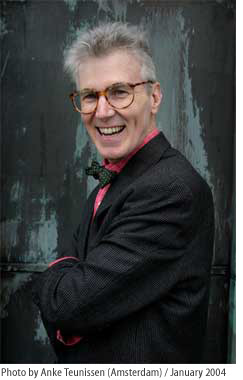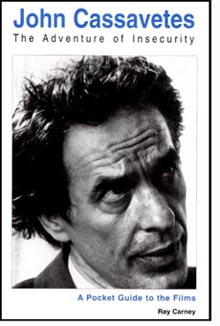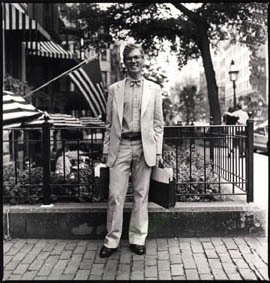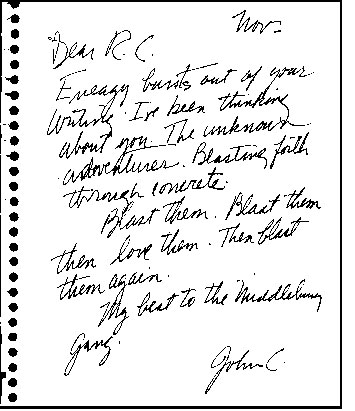|
 Michael
Fitzhenry: As far as English-language critics
go, you’re pretty much the guy on Cassavetes. Michael
Fitzhenry: As far as English-language critics
go, you’re pretty much the guy on Cassavetes.
Ray Carney: By default! I wish my
name had been Pauline Kael or Vincent Canby. I could have made more of
a difference over the years. It shows how hopeless most American reviewers
are—I won’t dignify them by calling them critics. But I shouldn’t bash
journalists. Film professors are worse—even more behind the time, even
less open to new ideas!
MF: Have you ever thought that maybe
Cassavetes’ films aren’t really that hot?
RC: (laughter) That’s actually the
position I started from! I had a conversation a few years ago with Ben
Gazzara where he comically referred to newspaper reviewers as "slow
learners" when it came to Cassavetes’ work. We were doing a retrospective
and they were still panning the movies! Recycling their reviews from twenty
years earlier. Well, I’m ashamed to admit it, but I was a slow learner
myself. I fought a number of the films tooth and nail before I finally,
very gradually, came to terms with them.
 I’ll never forget the first time I walked
into a Cassavetes movie. It was Faces, many years ago. I was a
college student who had never even heard of Cassavetes, simply looking
for something to see on a Saturday night. I remember it as clearly as
if it were yesterday—not because I enjoyed the film but because I couldn’t
stand it. It was too intense, too demanding, too disorienting—just too
much. I stormed out five minutes into the first reel. I’ll never forget the first time I walked
into a Cassavetes movie. It was Faces, many years ago. I was a
college student who had never even heard of Cassavetes, simply looking
for something to see on a Saturday night. I remember it as clearly as
if it were yesterday—not because I enjoyed the film but because I couldn’t
stand it. It was too intense, too demanding, too disorienting—just too
much. I stormed out five minutes into the first reel.
I went back to the same movie theater about
a week later to give the film one more try, only to walk out again after
about a half hour. Then a few days later, I did something inexplicable
even to myself: I went back yet a third time and finally managed to sit
through the whole film—by this point as completely confused about my own
state of confusion as I was about the film itself.
I didn’t have the faintest idea what it was
that simultaneously drove me away and kept drawing me back. When I’d walked
out of other movies, I sure hadn’t gone back to see them again! All I
knew was that movies weren’t supposed to be like this. Faces offended,
violated, upset me in a way no film had ever done before. It reached me
in a deeper place. Other movies, even at their most serious, their most
emotionally engrossing, were not threatening, not disorienting in this
way. What did this filmmaker think he was doing? Who did he think he was?
I still secretly thought it was all a fluke—something
about my personal life that made me overreact. (I was having serious girlfriend
problems.) It was only after I saw Minnie and Moskowitz and A
Woman Under the Influence—walking in on them more or less by accident
too—that it slowly began to dawn on me that maybe, just maybe this filmmaker
was doing something entirely different from other films I had seen.
All of my writing is really just an attempt
to understand my own confusion, I guess. I’m now convinced that the greatest
art always does something like that. It doesn’t give us what we want,
but what we need.
* * *
 RC:
In both life and art, Cassavetes was interested in the moments when our
patterns are disrupted. He was interested in the moments when we’re left
a little exposed and vulnerable. Those moments when some of the little
routines that get us through life break down. That’s the subject of the
films. He was supersensitive to those little emotional routines we’re
trapped in and don’t know it. RC:
In both life and art, Cassavetes was interested in the moments when our
patterns are disrupted. He was interested in the moments when we’re left
a little exposed and vulnerable. Those moments when some of the little
routines that get us through life break down. That’s the subject of the
films. He was supersensitive to those little emotional routines we’re
trapped in and don’t know it.
For me personally, this side of him came
out in conversation in the way he could look at someone and instantly
"do" them. He was extraordinarily perceptive about people, all
those little things that make us us. I’d be eating lunch with him, someone
would come up to the table, and the second they were gone, or in the middle
of a story about them, he would momentarily switch into their voice and
gestures. He had a sixth sense for sniffing out people’s emotional and
intellectual habits, the patterns of thinking we are enslaved to and don’t
even recognize. If someone was there—a waitress or whatever—he would push
their buttons to try to see if he could get them out of them, or at least
make them see them. He would say or do almost anything!
He pushed my buttons too—said things to "get
to me" or tease me or test me. Saying things about my opinions about
his work, for example. I’d praise a movie and he’d put it down. ("Oh,
you like my entertainment picture," he said patronizingly,
when I told him how wonderful I thought Minnie and Moskowitz was.
"I think I’ll really be remembered only as an actor. That’s my best
work"—when I praised his directing.) But then if I criticized a scene,
he would defend it! When it didn’t make me laugh, it really got to me
at times. He loved to test people. The very fact that I still remember
all this stuff shows that he pushed buttons that have stayed pushed!
 But it was not in life but in the films that
it was done most brilliantly. He wanted to trip up people’s routines,
mess with their minds—both viewers and characters. Look at Faces.
It’s about Super Salesmen—guys who can sell anybody anything at anytime,
but what John was interested in was the moment their sales pitches are
no longer sufficient, the times a raw emotion comes out. Look at The
Killing of a Chinese Bookie. Cosmo Vitelli thinks he’s figured out
life and that it all comes down to a carnation and a tuxedo jacket, and
if you just look classy or charming or stylish everything is going to
go smooth. Then suddenly he gets tangled up with the Mob and finds out
what reality is. But it was not in life but in the films that
it was done most brilliantly. He wanted to trip up people’s routines,
mess with their minds—both viewers and characters. Look at Faces.
It’s about Super Salesmen—guys who can sell anybody anything at anytime,
but what John was interested in was the moment their sales pitches are
no longer sufficient, the times a raw emotion comes out. Look at The
Killing of a Chinese Bookie. Cosmo Vitelli thinks he’s figured out
life and that it all comes down to a carnation and a tuxedo jacket, and
if you just look classy or charming or stylish everything is going to
go smooth. Then suddenly he gets tangled up with the Mob and finds out
what reality is.
MF: So do you think that was a prime
goal for Cassavetes? To investigate those sort of ideas about performance
or self?
RC: Let me make something clear. Cassavetes
would hate this way of talking about his movies! He’s scream at us. He’d
throw something. Or laugh with that wonderful cackle. It’s too abstract
and intellectual. There was a deep strain in him that not only didn’t
understand but was antipathetic to the idea of being an intellectual or
a critic. He’d say to me, why do you want to write about these films anyway?
He thought I was wasting my time. His interest in experience was as it
was lived, and he tries to get those raw moments into the movies. People
who intellectualize, people who rise above the mess by making a theory
about it, are people he didn’t understand and didn’t trust. They are the
ones he puts in his movies. He just never got around to intellectuals
and critics. Probably didn’t think they were important enough! Boy, would
the French be shocked by that! (laughs)
 MF: At no point would he intellectualize
what he was trying to accomplish? Like how’d he feel about, for example,
Cosmo slipping out of the role he’d been performing so comfortably? MF: At no point would he intellectualize
what he was trying to accomplish? Like how’d he feel about, for example,
Cosmo slipping out of the role he’d been performing so comfortably?
RC: John was a profoundly instinctual
artist. He didn’t understand people or experiences abstractly, but practically.
He had what Hemingway called an unfailing bullshit detector when he saw
something. He could tell if someone was faking it. He could tell if they
were coasting on a routine. He could tell if they had some fancy-schmancy
theory about what they were doing that was just for their own vanity.
His art came from his gut reactions about life.
You ask about Cosmo. Ben Gazzara told me
that when he was playing the role, he was having great difficulty understanding
it. As an actor, he was uncomfortable and bewildered. One night he said
to John, "I just don’t understand who this guy is." And John
took him aside, and they huddled together in the back seat of a car. And
John started crying. Now I don’t know if the crying was an act or if it
was sincere, but I don’t really care. John started crying, and looked
at Ben and said, "Ben, do you know who those gangsters are? They’re
all those people who keep you and me from our dreams. All the Suits, all
the people who stop the artist from doing what he wants to do. That’s
what you are as Cosmo. You’re somebody that just wants to be left alone
to do what you want to do. And there’s all the bullshit that comes in,
all these Suits that come in and start messing up your life. Why does
it have to be like that?"
Does that make clear what it is to be an
instinctual artist? John didn’t make the movie based on some idea about
life. It wasn’t born out of some theory. Bookie wasn’t abstract
to him. It was personal! You couldn’t get further from movies like Pulp
Fiction and L.A. Confidential. Bookie wasn’t created
to play with the genre. It wasn’t written and edited to spring
a series of surprises on the viewer, or open narrative trap doors under
him. It wasn’t about playing games with expectations, tricks with how
to tell a story. It wasn’t about goofing on formulas and styles. It was
real. It mattered. It was John’s life. It was about the Suits, the producers,
the fancy contract guys who come in and say "sign here" and
get in the way.
John didn’t go into a film with a theory
about "systems of expression" or "meanings in motion"
or "pragmatic understandings"—all that stuff I translate him
into. He didn’t understand or care for theory and criticism. He didn’t
think that abstractly. But he was so in touch with his own feelings and
experiences that he almost stumbled into insights about the ways we fall
into emotional traps, the ways we imprison ourselves in our own conceptions
of ourselves. His works are intellectually profound and theoretically
revolutionary in the extreme, but their insights came from life, not from
theory—from feeling not from thinking. That’s of course the best place
to get them. The truest place.
This
page only contains excerpts from an interview with Ray Carney, the author
of John Cassavetes: The Adventure of Insecurity. To learn how to
obtain the book, please click
here.
|









